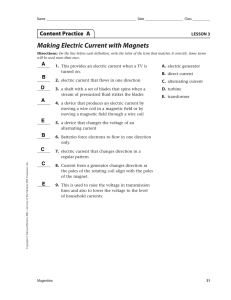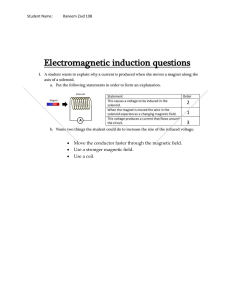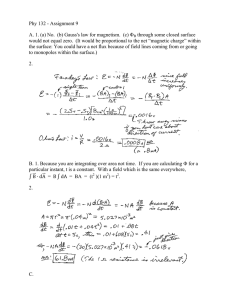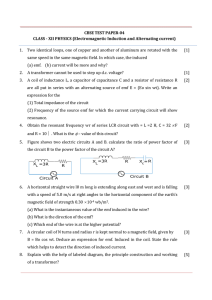Electromagnetism Solutions Manual: Practice Problems & Answers
advertisement
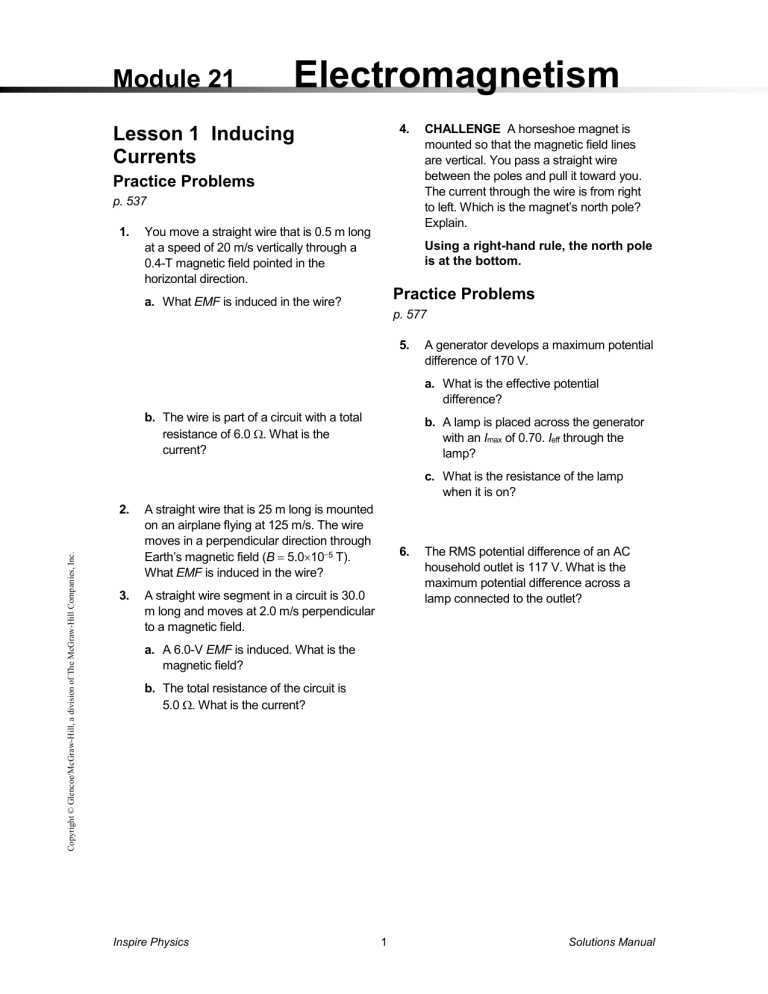
Module 21 continued Module 21 Electromagnetism Lesson 1 Inducing Currents 4. Practice Problems p. 537 1. You move a straight wire that is 0.5 m long at a speed of 20 m/s vertically through a 0.4-T magnetic field pointed in the horizontal direction. CHALLENGE A horseshoe magnet is mounted so that the magnetic field lines are vertical. You pass a straight wire between the poles and pull it toward you. The current through the wire is from right to left. Which is the magnet’s north pole? Explain. Using a right-hand rule, the north pole is at the bottom. Practice Problems a. What EMF is induced in the wire? p. 577 5. A generator develops a maximum potential difference of 170 V. a. What is the effective potential difference? b. The wire is part of a circuit with a total resistance of 6.0 . What is the current? b. A lamp is placed across the generator with an Imax of 0.70. Ieff through the lamp? c. What is the resistance of the lamp when it is on? Copyright © Glencoe/McGraw-Hill, a division of The McGraw-Hill Companies, Inc. 2. 3. A straight wire that is 25 m long is mounted on an airplane flying at 125 m/s. The wire moves in a perpendicular direction through Earth’s magnetic field (B 5.0105 T). What EMF is induced in the wire? 6. A straight wire segment in a circuit is 30.0 m long and moves at 2.0 m/s perpendicular to a magnetic field. The RMS potential difference of an AC household outlet is 117 V. What is the maximum potential difference across a lamp connected to the outlet? a. A 6.0-V EMF is induced. What is the magnetic field? b. The total resistance of the circuit is 5.0 . What is the current? Inspire Physics 1 Solutions Manual Module 21 continued 7. 8. If the average power used over time by an electric light is 75 W, what is the peak power? 11. You (the rider) provide the mechanical energy that turns the generator’s armature. CHALLENGE An AC generator delivers a peak potential difference of 425 V. a. What is the Veff in a circuit connected to the generator? 12. 13. Frequency What changes to an electric generator are required to increase frequency? You could increase the number of magnetic pole pairs or make the armature spin faster. Lesson 1 Check Your Progress p. 577 Electric Generator Explain how an electric generator works. 14. Output Potential Difference Explain why the output potential difference of an electric generator increases when the magnetic field is made stronger. What is another way to increase the output potential difference? The magnitude of the induced EMF is directly related to the strength of the magnetic field. A greater potential difference is induced in the conductor(s) if the field strength is increased. Because EMF BLv(sin ), you can also increase output potential difference by increasing the length of the wire or the velocity of the wire. Generator Could you make a generator by mounting permanent magnets on a rotating shaft and keeping the coil stationary? Explain. 15. Yes; only relative motion between the coil and the magnetic field is important. Note, this generator would not have much power as the relative velocities of the magnets and coil will be very small. Critical Thinking A student asks, “Why does AC dissipate power? The energy going into a lamp when the current is positive is removed when the current is negative. The net current is zero.” Explain why this reasoning is wrong. Power is the rate at which energy is transferred. Power is the product of I and V. When I is positive, so is V, and therefore, P is positive. When I is negative, so is V; thus, P is positive. Energy is always transferred through the lamp. Solutions Manual 2 Inspire Physics Copyright © Glencoe/McGraw-Hill, a division of The McGraw-Hill Companies, Inc. An EMF is induced in the armature of a generator at it is turned—by a mechanical force—in a magnetic field. When the generator is in a circuit, the EMF induces a current. As the armature rotates through 180°, the induced EMF—and current—reverse direction. 10. Microphone Consider the microphone shown in Figure 3. What happens when the diaphragm is pushed in? A current is induced in the coil. b. The resistance is 5.0102 . What is the effective current? 9. Bike Generator A small generator on your bike lights the bike’s headlight. What is the source of the energy for the bulb when you ride along a flat road? Module 21 continued Lesson 2 Check Your Progress Lesson 2 Applications of Induced Currents p. 585 18. Practice Problems p. 584 16. A step-down transformer has 7500 turns on its primary coil and 125 turns on its secondary coil. The potential difference across the primary circuit is 7.2 kV. What is the potential difference across the secondary circuit? If the current in the secondary circuit is 36 A, what is the current in the primary circuit? Away from the magnet; the changing magnetic field induces a current in the coil, producing a magnetic field. This field opposes the field of the magnet, and thus, the force between coil and magnet is repulsive. 19. CHALLENGE A step-up transformer that is 95 percent efficient has 300 turns on its primary coil and 90,000 turns on its secondary coil. The potential difference of the generator to which the primary circuit is attached is 60.0 V. What is the potential difference across the secondary circuit? The current in the secondary circuit is 0.50 A. What current is in the primary circuit? Motors If you unplugged a running vacuum cleaner from a wall outlet, you would be much more likely to see a spark than you would if you unplugged a lighted lamp from the wall. Why? The inductance of the motor creates an EMF that causes the spark. The bulb has very low self-inductance, so there is no EMF. 20. Transformers and Current Explain why a transformer may be operated only on AC. Transformers rely on changing currents to induce changing magnetic fields. DC always produces the same magnetic field and thus can’t induce a current in another wire. Copyright © Glencoe/McGraw-Hill, a division of The McGraw-Hill Companies, Inc. 17. Lenz’s Law You hang a coil of wire with its ends joined so that it can swing easily. If you now plunge a magnet into the coil, the coil will start to swing. Which way will it swing relative to the magnet and why? 21. Transformers Frequently, transformer coils that have only a few turns are made of very thick (low-resistance) wire, while those with many turns are made of thin wire. Why? More current can go through the coil with fewer turns, so thick wires with capacity for large currents are needed. Also, resistance must be kept low to prevent voltage drops and I 2R power loss and heating. Inspire Physics 3 Solutions Manual Module 21 continued 22. Step-Up Transformers Refer to the step-up transformer shown in Figure 15. Explain what would happen to the primary current if the secondary coil were short-circuited. According to the transformer equations, the ratio of primary to secondary current is equal to the ratio of turns and doesn’t change. Thus, if the secondary current increases, so does the primary. 23. Critical Thinking Would permanent magnets make good transformer cores? Explain. No; induced EMF depends on a changing magnetic field through the core. Permanent magnets are “permanent” because they are made of materials that resist such changes. Copyright © Glencoe/McGraw-Hill, a division of The McGraw-Hill Companies, Inc. Solutions Manual 4 Inspire Physics Module 21 continued 26. Protons passing without deflection through a magnetic field of 0.060 T are balanced by an electric field of 9.0103 V/m. What is the speed of the moving protons? 27. Challenge What trajectory would a positive ion follow moving in a magnetic field that increases linearly with time? Lesson 4 Electric and Magnetic Fields in Space 39. An electromagnetic wave has a frequency of 8.2014 Hz. What is the wavelength of the wave? 40. What is the frequency of an electromagnetic wave that has a wavelength of 2.2102 m? 41. CHALLENGE If an electromagnetic wave is propagating to the right and the electric field is in and out of the page, in what direction is the magnetic field? Practice Problems p. 595 38. What is the wavelength of green light that has a frequency of 5.701014 Hz? up and down Copyright © Glencoe/McGraw-Hill, a division of The McGraw-Hill Companies, Inc. Practice Problems p. 599 Inspire Physics 5 42. What is the speed of an electromagnetic wave traveling through air? Use c 299,792,458 m/s in your calculation. 43. Water has a dielectric constant of 1.77. What is the speed of light in water? 44. The speed of light traveling through a material is 2.43108 m/s. What is the dielectric constant of the material? Solutions Manual Module 21 continued 45. Challenge A radio signal is transmitted from Earth’s surface to the Moon’s surface, 376,290 km away. What is the shortest time a reply can be expected? 49. Round-trip distance is 752,580,000 m. They also must be horizontal. x 752,580,000 m 2.51034 t 2.5109 ss c 299,792,458 m/s 50. Lesson 4 Check Your Progress Electromagnetic Waves Explain how electromagnetic waves propagate through space. The changing electric field induces a changing magnetic field, and the changing magnetic field induces a changing electric field. The waves propagate as these two fields regenerate each other. 47. 51. Antenna Design Would an FM antenna designed to be most sensitive to stations near 88 MHz be shorter or longer than one designed to receive stations near 108 MHz? Explain your reasoning. Longer; lower-frequency waves would have longer wavelengths, so they use a longer antenna. Interaction with Matter How do different wavelengths of electromagnetic radiation interact with matter? How does this affect how we use and interact with the radiation? 52. Dielectric Constant The speed of light traveling through an unknown material is 1.98108 m/s. Given that the speed of light in a vacuum is 3.00108 m/s, what is the dielectric constant of the unknown material? Frequency An electromagnetic wave has a wavelength of 1.5×10−5 m. What is its frequency? Solutions Manual 6 Inspire Physics Copyright © Glencoe/McGraw-Hill, a division of The McGraw-Hill Companies, Inc. Longer-wavelength electromagnetic radiation is generally converted into thermal energy when it interacts with matter. Shorter-wavelength electromagnetic radiation can ionize atoms and damage living cells. How we use electromagnetic radiation is determined in part by how it interacts with matter. For example, safety precautions must be taken when using shorter-wavelength electromagnetic radiation such as Xrays or gamma rays. 48. Digital Signals What are the advantages of storing and transmitting sound, pictures, and data as digital signals? Digital signals can be stored reliably in computer memory and sent over long distances. They can send more information in the same amount of time as AM or FM and are less affected by noise. p. 603 46. Radio Signals Radio antennas normally have metal rod elements that are oriented horizontally. From this information, what can you deduce about the directions of the electric fields in radio signals? Module 21 continued Analyze and Interpret Data 53. Critical Thinking Most of the UV radiation from the Sun is blocked by the ozone layer in Earth’s atmosphere. Scientists have found that the ozone layer over Antarctica and the southern hemisphere has thinned. Use what you have learned about electromagnetic waves to explain why some scientists are very concerned about the thinning ozone layer. 1. a. In the first novel, how should the aliens’ eyes compare in size to human eyes? The eyes would be much larger because the wavelength of microwave radiation is much larger than that of visible light. b. Is Wells correct that the invisible man is able to see? If the entire ozone layer is thinning, the amount of UV radiation from the Sun that is blocked by the ozone layer decreases, allowing more UV rays to reach Earth’s surface. The wavelengths of UV waves are short enough and their energies are high enough to damage skin molecules. Thus, the resulting increase in UV rays might increase the prevalence of skin cancer in humans. To see, you must detect the light, which means the light will be absorbed or scattered. Essentially, an invisible person would be completely transparent so light would just pass through the eye without ever being absorbed or scattered. c. Is the “anti-Lenz’s law” possible? Go Further No. It would violate the law of conservation of energy. It would allow a changing magnetic field to grow without limits. The current would increase without any work done. A generator would create energy, not just change it from one form to another. Data Analysis Lab p. 607 Can you evaluate scenarios in science fiction novels? Copyright © Glencoe/McGraw-Hill, a division of The McGraw-Hill Companies, Inc. Claim Answer the following questions You and your friends are reading a collection of science fiction books. After you read a book, you meet to discuss whether the science presented in the book is possible. 2. Evidence What scientific information or principles support each of your claims? Students should use key concepts from this module to provide support for their claims. Possible citations in this text include: a. In one novel, alien beings have eyes that are sensitive to microwaves. b. In H. G. Wells’s novel The Invisible Man, a man drinks a potion and becomes invisible, although he retains all his other faculties including his ability to see. a. Text under the heading “Receiving Electromagnetic Waves” and its subheads, pp. 601–603 and the information in Figure 24 on p. 597. b. Text under the heading “Receiving Electromagnetic Waves” and its subheads, pp. 601–603; text under “Sources of light” on p. 386. b. Text under the heading “Lenz’s Law,” pp. 578–579. c. A scientist in a third novel discovers an “anti-Lenz’s law” that states an induced current results in a force that increases the change in a magnetic field. Thus, when more energy was demanded, the force needed to turn a generator was reduced. 3. Reasoning Explain your reasoning for each of the claims that you have made. Students should use the key concepts listed above to explain their reasoning and justify their claims. Inspire Physics 7 Solutions Manual
